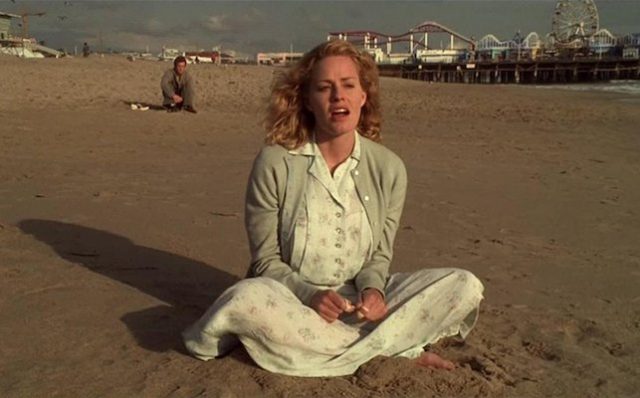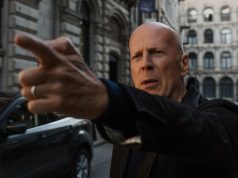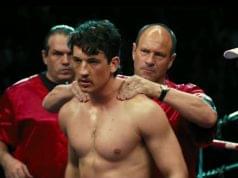
After being nominated for an Oscar for her performance in “Leaving Las Vegas,” Elisabeth Shue called her agent and said, “Now is the time for me to play a retarded woman who falls in love with her brother.” This was a taller order than you might expect. Hollywood was brimming with unproduced screenplays about mentally disabled people, and incest scripts are always in fashion, of course. But they didn’t overlap. None of the retarded screenplays had incest, and none of the incest screenplays had retarded people. Elisabeth Shue had to wait a few years, until finally some scribe dipped his incest chocolate in the mentally disabled peanut butter and came up with “Molly.”
This miraculously ill-conceived debacle was released in 1999 to a flurry of apathy and a box office gross of $17,650. (Really!) Shue plays the title character, a 28-year-old woman who has lived in an institution since the death of her parents some years earlier. Molly is described as being mentally retarded with some autistic tendencies and a hint of savant — basically, whatever the movie needs her to be at any given moment. Shue’s idea of playing “mentally challenged” is to speak in the sort of slurry simpleton’s voice that has been getting elementary-school class clowns in trouble for generations. It’s OK here, though, because Shue isn’t making fun of anyone. She’s ACTING!
Before we meet Molly, we meet her brother, Buck, played by the chinful Aaron Eckhart. He’s a hotshot advertising executive who’s been ignoring his sister these last several years. But that’s about to change, because the state-run mental institution she’s in is being shut down. This is bad news, although it means you could probably get a pretty good deal on some used lab coats and clipboards. It also means Molly will have to live with Buck! The idea of simply transferring her to another institution is not mentioned, leaving us to assume this was the only mental-care facility there was, anywhere.
Buck is woefully unprepared to deal with Molly’s particular needs, and seems to have made no effort to get prepared. Not only was this the only mental-care facility in the world, but I guess it closed down with only a day’s notice! How can Buck care for his sister AND continue to be a hotshot adman? Luckily, his office building has a daycare center for the children of employees, so he figures he can drop Molly off there. Problem solved! He is astonished when the woman running the place tells him that a mentally disabled 28-year-old woman is not the same thing as a child. It had not occurred to Buck — who holds a college degree and functions capably in the professional world of intelligent grown-ups — that there might be any flaw in his plan to deposit Molly in daycare. Now thoroughly inconvenienced, he must take her with him to his office, where he tells the receptionist to keep an eye on her while he does his Big Presentation for the Big Client.
Now, unless you’ve never seen a movie before, you know that Molly is going to do something to disrupt the Big Presentation, and that hilarity will ensue. It’s the classic “Collision Course with Wackiness” setup. But I bet you won’t guess exactly how she disrupts it. Go ahead and make a guess. Take your time.
Finished? OK.
Here is what she does: She starts to feel too warm out in the lobby, so she strips off all her clothes and walks into the conference room stark naked. The Japanese businessmen hearing the Big Presentation — it’s always Japanese businessmen who hear Big Presentations — gawk and stare, and one of them says to the other, in subtitles, “Is this a great country, or what?” Yes, that’s America for you — nude handicapped women sauntering into business meetings, from sea to shining sea!
(Was that your answer? We’re on the honor system here, so please don’t cheat.)
Taking care of Molly is going to be harder than Buck thought! Which is only reasonable, since he didn’t think it would be hard at all. Fortunately, he is soon contacted by Dr. Susan Brookes (Jill Hennessy) of the Kerrans Institute for Neuropsychiatric Research, who thinks Molly might be a good candidate for one of their experiments in making people smarter. The details are sketchy, but the gist of it is that they’ll saw open her head and slap her brain like the side of a non-functioning computer monitor in the hopes of restarting it. Buck is mildly conflicted about letting them do this to his sister, so he has a half-hearted monologue with himself before deciding, after a full 30 seconds of inner struggle, that it’s OK, because he cares.
The brain-smacking surgery is a success, and Molly is almost instantly much, much smarter. It’s a lot like “Rise of the Planet of the Apes,” except that Caesar the chimp usually kept his clothes on. Molly starts reading novels and having normal conversations, and she starts speaking in Elisabeth Shue’s normal voice. She doesn’t know much about how the world works, though, having been out of the loop for so long, and that is why she sees no problem with her decision to marry her brother Buck.
And who can blame her?? Buck is dreamy! Aaron Eckhart’s actual sisters, if they’re being honest, would surely admit that they find him sexually attractive as well. So Molly cannot be faulted for her affections. Buck gently explains that brothers and sisters cannot get married in the United States, at least not this far North, and encourages her to focus on Sam (Thomas Jane), a friend of hers from the old institution who has a learning disability but is able to care for himself, hold down a job, remained clothed, etc. Molly goes along with this but is still jealous when Dr. Susan Brookes has a fling with Buck. You never forget your first love.
I should also mention that one of the perks of being an autistic-retarded-savant is that Molly has superhuman hearing. She and Buck go to a baseball game, where she’s able to make out what the umpire and manager are saying to each other even from the cheap seats, even surrounded by the din of the ballpark. This is because the screenwriter read that people with autism sometimes have an increased sensitivity to noise, and he decided that meant they can pinpoint specific conversations from far away, like Superman. “Why don’t we employ autistic people to help with FBI surveillance??” the screenwriter probably wondered. “We’re sitting on a goldmine here!”
(By the way, the screenwriter is Dick Christie, an actor best known for playing the dad who built a robot daughter on “Small Wonder.” So maybe that’s what he was thinking of? The “Small Wonder” robot daughter could probably hear sounds from far away.)
Anyway, it isn’t long before the process starts reversing and Molly starts losing her smarts. You know how it is when you smack the side of the computer monitor, and it clears up for a while, but then it goes out again? It’s like that. This leads to an interminable series of poignant adventures, including Molly interrupting a performance of “Romeo & Juliet” because she thinks it’s real and that Romeo is about to poison himself, and Molly freeing lobsters from a fancy restaurant. In the end, Molly teaches Buck a valuable lesson about life: Never take your sister anywhere.
No, the lesson Buck learns is that maybe we should all be as honest, as forthright, as spontaneous, as free-spirited, and as naked as Molly. She might have some glitches in her internal code, but she’s happy. Of course, she’s happy because she has no idea what’s going on, but that’s a small price to pay in exchange for being able to take your clothes off in public without being arrested.
— Film.com





